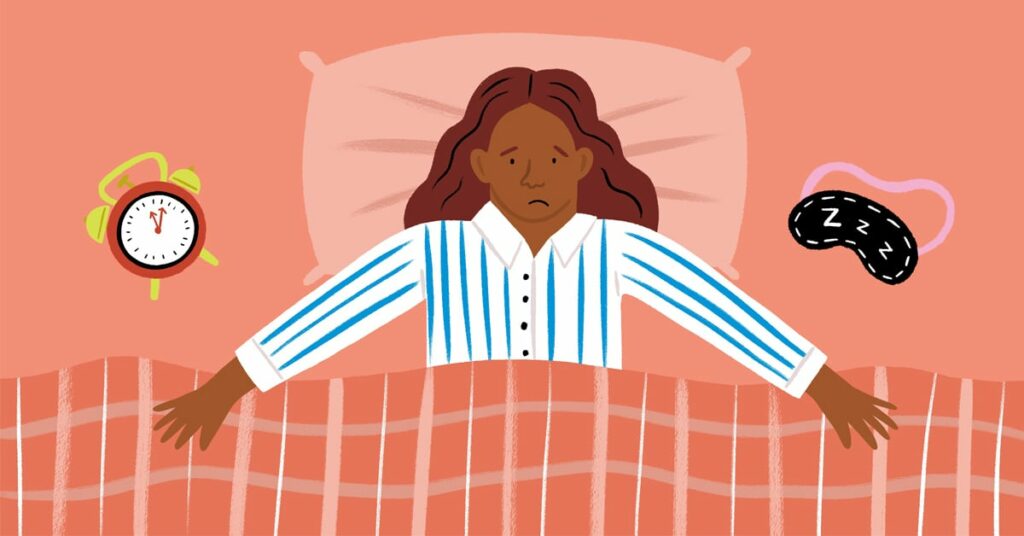
By Lisa Fields
Clinically reviewed by Dr. Gayle Jensen-Savoie
It isn’t your imagination: Going to bed, falling asleep, awakening easily and feeling well-rested may seem like they’re out of your reach, while your friends or relatives without ADHD don’t have similar problems. Some of the hallmark behaviors of ADHD may prevent you from getting the rest that you need, despite your best efforts.
“ADHD self-regulation impairment creates problems in all lifestyle routines, including sleep,” says Daniel Wysocki, EdS, a psychological examiner and therapist based in Jonesboro, Ark., who diagnoses and treats patients with ADHD.
If you don’t get the sleep that you need, you may adopt habits to feel alert during the day. Often, these strategies backfire.
“You might… take a nap, (or) you might drink more coffee,” says Amy Marschall, PsyD, a licensed psychologist based in Sioux Falls, S.D., who treats patients with ADHD, anxiety and depression. “The ways that you compensate to stay alert during the day causes you to not feel as rested and ready for bed the following night. It becomes that ongoing cycle.”
Feeling tired during the day may have negative consequences, making it more challenging for you to accomplish things.
“Not getting restful sleep can have devastating effects on work, school and home responsibilities, leading to even more stress,” Wysocki says. “Lack of sleep can worsen ADHD symptoms. And solving sleep issues can help improve symptoms.”
Why people with ADHD may have sleep problems
Some people with ADHD have difficulty going to bed when the time approaches, either because they’re absorbed in an activity or because they aren’t good at transitioning from one activity to another.
“People with ADHD experience hyperfocus periods — get really into what they’re doing — and not realize how late it’s gotten,” Marschall says. Marschall says others may say: “’I’m doing (this, so) I might as well keep going.’ It’s harder to shift into that rest, getting ready for bed.”
For those who make it to bed at a reasonable hour, constant thoughts may make it hard to relax.
“Sometimes you have what we call cognitive hyperactivity, which is the racing thoughts,” Marschall says. “It’s really hard to fall asleep because you lay down and your thoughts are still going on.”
Waking up can be a challenge for people with ADHD, especially if you didn’t sleep for long enough. If you stay up too late or lie awake with your thoughts, your total sleep time may be shortened.
Strategies that help people with ADHD go to bed on time
If you experience time-blindness — becoming so absorbed in what you’re doing that you don’t realize how late it’s gotten — you may miss bedtime, even if you don’t mean to. Adding cues to your schedule may provide the nudge that you need to go to bed.
Some people hang more clocks in their home. Others set a nighttime alarm on their phone when they want to get ready for bed. If you spend time in the same room every evening, consider plugging a lamp into a timer, so that the light goes off when you should go to sleep.
You may learn to go to bed on schedule by depending on others, even if you don’t ask anyone for help.
“Cues in the environment could include following the schedule of others,” Wysocki says. “Find a routine-oriented roommate or even adopt a pet. Each of these will encourage you to follow a more regular schedule.”
Following a set bedtime routine every night should help your brain associate those behaviors with winding down and falling asleep.
Some people spend the last half hour of the day in dim lighting. Other people take a warm shower. Still others lie down and read a book. (Opt for a real book with paper pages, not a tablet or smartphone, to avoid light stimulation from the device.) Personalize your bedtime routine so that you’ll follow it nightly.
“It’s less about what you do and more about doing the same thing,” Marschall says. “Your brain pairs it, like, ‘Okay, when I do this, that means it’s starting to be time to get ready for bed.'”
Tweaking bedroom habits may improve sleep
Once you’re lying in bed, eliminating distractions may help you fall asleep more quickly. For many people, an ever-present smartphone is a temptation at bedtime, and alerts may awaken you in the night. Do-not-disturb settings may help somewhat, but sleep experts recommend that you ban your phone from the bedroom.
“Replace the smartphone alarm (and) start using a digital or analog alarm clock,” Wysocki says. “This will unchain our brain (from) the common, unhealthy habit of excessively scrolling through the night and waking to being stuck scrolling in bed.”
Sometimes, noises in a sleep environment make it challenging for someone with ADHD to drift off. Whether you’re distracted by traffic or your partner’s snores, a constant sound, like a running fan or a white-noise machine, may help.
Some people with ADHD who experience racing thoughts at bedtime prefer to sleep with background noise, such as music or television. Marschall, who has ADHD, finds it helpful to put on TV reruns that she’s seen multiple times, which serve as distraction from her thoughts.
“My brain is saying, ‘Nope, we’re focused on the storyline. We’re listening to the show,'” Marschall says. “It’s something that is familiar enough, because I’ve seen it many times, that it’s not stimulating me to stay awake.”
If you like it quiet at bedtime but you have trouble falling asleep because your mind is racing, try to focus on something relaxing.
“Fill that space with thoughts related to simple but fulfilling tasks or hobbies you enjoy,” Wysocki says. “If your mind drifts back to worries or concerns, return it to your mindful thoughts about something you find enjoyable.”
Morning strategies may make it easier to wake up
Sleeping in a dark room encourages sleep, but arising in a dark room may make it hard to feel awake and alert. If you’re groggy every morning, consider adding morning light to your routine, even before you get out of bed.
Instead of using room-darkening blinds, choose window coverings that let in natural light. Or invest in a sunrise alarm clock, which gradually brightens during the 20 or 30 minutes before the alarm goes off, so that you awaken in a pleasantly lit space.
“Having light come in can help your brain to make that adjustment,” Marschall says. “Sunlight can help your brain to say, ‘Okay, it’s time to be awake. It’s time to be alert.'”
Forcing yourself to get out of bed when it’s time to wake up may also get you in the habit of arising when it’s time.
“If you’re able to, have the alarm across the room from you, so you have to get up to turn it off,” Marschall says.
See a therapist for suggestions
If you change your bedtime habits and still have trouble falling asleep or waking up, ask your doctor or therapist for guidance.
“Sleeplessness and somnolence (feeling sleepy) throughout the day could be a by-product of depression,” Wysocki says. “This is one of the reasons it’s best to speak to a specialist for a full treatment plan.”





